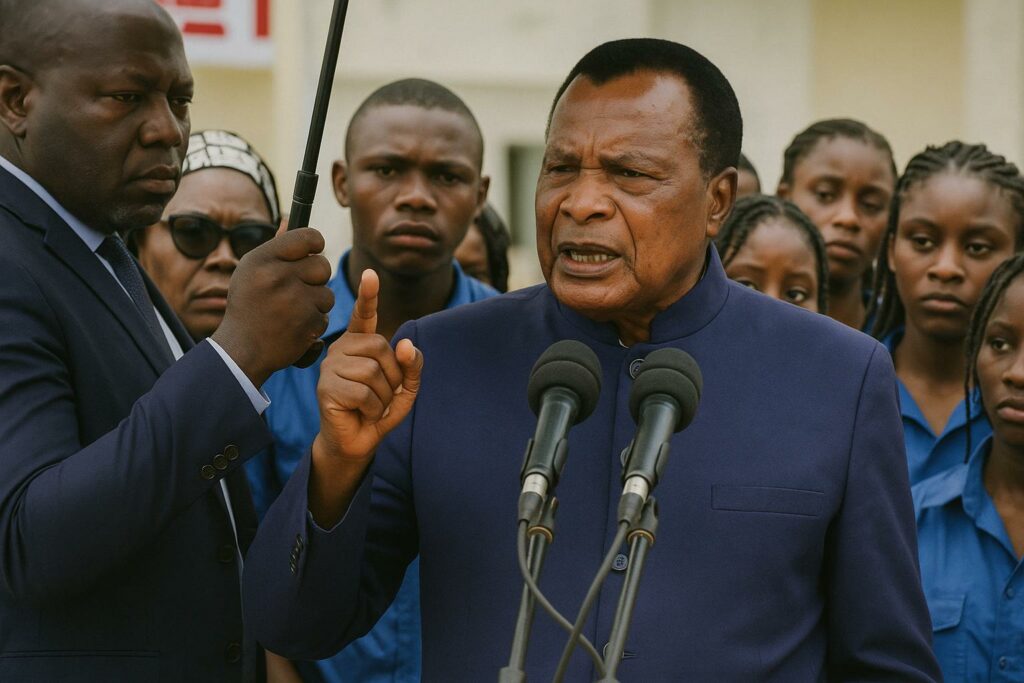Presidential green light for the DGSP crackdown
From the grandstands of the newly inaugurated Liberté School Complex in Talangaï, President Denis Sassou Nguesso addressed journalists eager for clarity on the ongoing police raids against the so-called ‘bébés noirs’ and ‘kulunas’. Without hesitation, the Head of State acknowledged that the order had come directly from his office. “The Commander-in-Chief may designate any unit for a special operation,” he observed, insisting that the Direction générale de la sécurité publique (DGSP) is acting within a clear presidential mandate to re-establish calm in the capital.
The operation, launched several weeks ago, follows a surge in armed robberies and machete attacks attributed to youthful gangs in Brazzaville and Pointe-Noire. While early police deployments reportedly stalled, the President took the symbolic step of mobilising the elite Presidential Security Unit to reinforce the effort. “This is not a flash in the pan,” he assured, hinting at an enduring commitment unlikely to fade with the news cycle.
A doctrine of peace reiterated since 2000
Revisiting a theme that threads through his public addresses, Denis Sassou Nguesso portrayed the latest security push as part of a long-term doctrine aimed at stabilising a nation historically prone to upheaval. He recalled that, from the proclamation of the Republic to the civil conflicts of 1997-1999, the Congolese public had rarely enjoyed sustained tranquillity. “In all my speeches I insist on peace,” he reminded reporters, positioning the 2000s as a deliberate pivot toward normalising daily life for citizens.
By stressing continuity with that agenda, the President sought to anchor the current crackdown in a broader narrative of nation-building rather than a reactive show of force. Analysts note that this framing resonates with communities fatigued by intermittent violence, even as civil-liberties advocates call for transparent oversight of security operations to prevent excesses.
Operational precedent: lessons from the Pool
The decision to deploy elements of the Presidential Guard revives memories of the Pool region offensive, during which specially trained units were credited with swiftly neutralising insurgent strongholds. Citing the “particular, severe, solid” training these troops receive, Denis Sassou Nguesso suggested they are uniquely qualified for urban pacification. The precedent is wielded to reassure sceptics who fear that routine police structures lack the capacity—or the stamina—to grapple with agile street gangs that readily relocate when pressure mounts.
Government sources maintain that the joint force will prioritise Brazzaville and Pointe-Noire before extending to secondary cities, mirroring the pursuit tactics used in the Pool. The sequencing is intended to prevent criminal displacement while avoiding overextension of security resources.
Legal mandate of the Presidential Security Unit
Behind the political rhetoric lies a formal framework. The decree establishing the Presidential Security Unit, the Head of State underscored, integrates the formation into the broader Force publique, thereby authorising it to participate in maintaining public order whenever national security so demands. By drawing attention to this legal anchor, the President shielded the operation from accusations of ad-hoc improvisation.
He buttressed the argument with an international analogy: France’s Vigipirate scheme, which saw army patrols supplement conventional policing after terrorist attacks. The comparison serves a dual purpose—legitimising the Congolese response through reference to a mature democracy and signalling that military participation in domestic security is not ipso facto an infringement of civil rights, provided it remains proportionate and time-bound.
Public expectations and calibrated timelines
On the streets of Talangaï, residents voice cautious optimism. Many welcome the visible patrols, saying the nightly return of quiet is the first tangible dividend of the operation. Others, mindful of past initiatives that fizzled once media attention waned, press for measurable benchmarks and community engagement to ensure lasting impact.
For the Presidency, managing those expectations may prove as challenging as the security threat itself. The Head of State’s vow that the campaign will continue “everywhere the gangs flee” hints at a rolling, adaptive strategy rather than a fixed timetable. Success will be judged less by swift arrests than by whether ordinary Congolese can reclaim public spaces without fear—a test that could define the legacy of the current security drive.
The legal lens: proportionality and accountability
Jurists consulted by this newspaper observe that Congolese law entrusts the executive with broad latitude in safeguarding public order, yet also imposes constitutional limits designed to protect individual liberties. The invocation of the Presidential Security Unit is lawful, they concur, provided arrests adhere to due-process guarantees and oversight mechanisms remain active.
Parliamentary committees and the National Human Rights Commission will therefore be under close watch to document operational conduct. Their regular reporting, coupled with the President’s public assurance of transparency, could help balance robust enforcement with the rule of law, reinforcing the peace narrative that underpins the entire enterprise.

